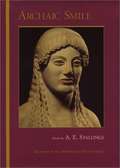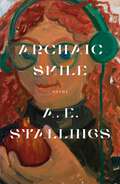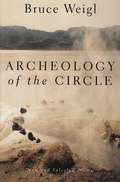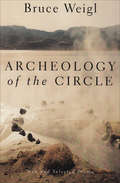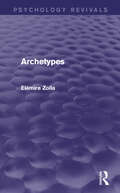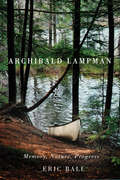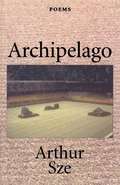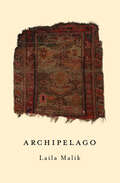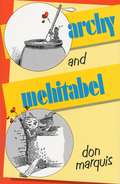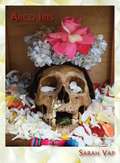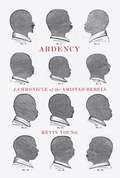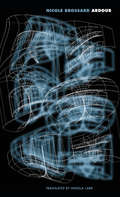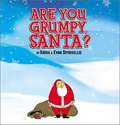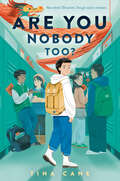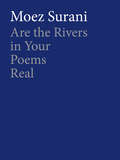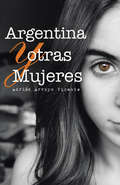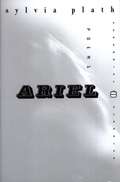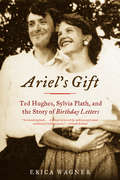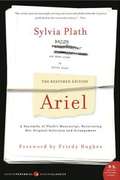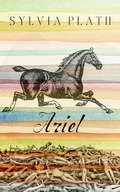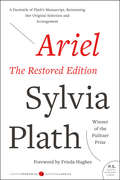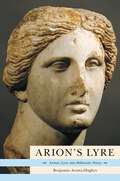- Table View
- List View
Archaic Smile: Poems
by A. E. StallingsArchaic Smile, by A.E. Stallings, recipient of the 1999 Richard Wilbur Award, uniquely juxtaposes poetic meditations on mythological themes with poems about the everyday occurances of contemporary life -- such as losing an umbrella or fishing with one's father.
Archaic Smile: Poems
by A. E. StallingsA new edition of A. E. Stallings's first book of poems, which was awarded the Richard Wilbur Award. In Archaic Smile, by the Pulitzer Prize and National Book Critics Circle Award finalist A. E. Stallings, the poet couples poetic meditations on classic stories and themes with poems about the everyday, sometimes mundane occurrences of contemporary life (like losing an umbrella or fishing with one’s father), and she infuses the latter with the magic of myth and history. With the skill of a scholar and translator and the playful, pristine composition of a poet, Stallings bridges the gap between these two distant worlds.Stallings “invigorates the old forms and makes them sing” (Meryl Natchez, ZYZZYVA) in her poetry, and the scope and origins of her talents are on full display in the acclaimed author's first collection. The poems of Archaic Smile are sung with a timeless, technically impeccable, and utterly true voice.
Archeology of the Circle: New and Selected Poems
by Bruce WeiglA range of poems from this contemporary poet, including work published as far back as the mid-1970s as well as new creations.
Archeology of the Circle: New and Selected Poems
by Bruce WeiglWith Song of Napalm, Bruce Weigl established himself as a poet of incomparable power and lyric fury, whose work stands as an elegy to the countless lives dramatically altered by war. Archeology of the Circle brings together the major work of one of America’s greatest poets. Collected here for the first time from eight volumes of poetry and spanning two decades, Archeology of the Circle also includes Weigl’s most recent poems, which take a dramatic turn toward a hard-bitten and sensuous lyric. Out of the horror of individual experience, Bruce Weigl has fashioned poetry that offers solace to disillusionment and bears transcendent resonance for all of us. Archeology of the Circle illustrates Bruce Weigl’s remarkable creative achievements and signifies his own personal and spiritual salvation through his writing.
Archetypes (Psychology Revivals)
by Elémire ZollaMan is dominated by his archetypes; they mould not only his history but his dreams. But how are we to define and evaluate them? Is it perhaps possible for us to relate more creatively to them? Originally published in 1981, these are some of the questions raised by this title. To answer them the author gathered together a vast amount of material drawn from Eastern and Western traditions, from science, literature, art and poetry. The answers he puts forward are often highly original and will surely challenge many of our most cherished patterns of thought. There emerges from this book what can only be described as a global metaphysical system, yet the author’s language is not that of an ordinary metaphysical treatise, and what he writes offered new challenge and hope to those suffering from the despair and cynicism engendered by a great deal in modern society at the time. Zolla does not, however, advocate a return to earlier historical patterns, nor is he proposing a new Utopia, but rather offers us a brilliant series of lessons in the art of centring. In the words of Bernard Wall, writing in the Times Literary Supplement, Zolla’s ‘deep, polymathic probing of the terms of human existence makes it sensible to compare him with Simone Weil, while some of his conclusions about ultimate mysteries – expressed in signs, symbols and sacraments, the sense of which we have lost – will make us think of the later T. S. Eliot’.
Archibald Lampman: Memory, Nature, Progress
by Eric BallTreasuring the past, savouring the present, and wanting to do right by the future, Archibald Lampman was a poet keenly focused on the workings of time. He was also a thinker of mystical predisposition. His goal was not to transcend time, but to find redemptive meaning within it. Archibald Lampman: Memory, Nature, Progress explores the ways in which Lampman pursued this goal in relation to the three faces of time. Memory fascinated Lampman. He relished the “alchemy” by which the dross of past experience could be left behind and the gold preserved. Nature compelled his mind and emotions, and his clear-eyed observations of both countryside and wilderness settings gave rise to a self-evolved poetics of inclusiveness. In his celebrations of nature in all its manifestations, mild or bleak, he anticipated the work of iconic Canadian painter Tom Thomson and he forecasted the environmentalism of our own time. Progress for Lampman spelled societal rectification. By forwarding the cause of social betterment, one was part of a movement larger than oneself, and this expansion, too, was redemptive. Archibald Lampman: Memory, Nature, Progress is the first book on this foundational figure in Canadian literature to appear in over twenty-five years and the first thematically focused study. Combining close analysis with biographical context, it shows how Lampman’s oeuvre was shaped by his responses to his physical surroundings and to his social-intellectual milieu, as filtered through his stubbornly independent outlook.
Archipelago
by Arthur SzeArthur Sze has captured what it means to be a Chinese-American through a book of poems. Sze's poetry moves beyond issues and questions of culture and into the natural world.
Archipelago
by Laila MalikThe islands of an archipelago are isolated above sea level but attached underwater; connected yet separate. archipelago, the debut poetry collection from Laila Malik, traces fragments of family, becoming and unbecoming against the shifting shorelines of loss, multigenerational migration, and (un)belonging.Malik's lyrical poems intertwine histories of exile and ecological devastation. Beginning with a coming of age in the 80s and 90s between Canada, the Arabian Gulf, East Africa and Kashmir, they subvert conventions of lineage, instead drawing on the truths of inter-ethnic histories amidst sparse landscapes of deserts, oceans, and mountains. They question why the only certainties of "home" are urgency and impossibility.At its core, archipelago is a letter to the daughters who come before and after, a quiet disclosure of barbed ancestral legacies that only come into focus through poetry.
Archy and Mehitabel
by Don MarquisThe now classic tale of Archy the cockroach and Mehitabel the cat in her ninth life. First published in 1927, this free verse poem has become an essential part of American literature.
Arco Iris
by Sarah VapIn her latest collection, Arco Iris, Sarah Vap explores race, tourism, market, history, intimacy, and the vulnerability of lives beneath the stamp of longstanding powers. Whiteness is considered through the action of travel in South America where white bodies disappear, or are invisible, or attempt to become irrelevant, or are impossible to destroy. These hallucinatory poems explore the subtle violence beneath the commonplace in a foreign land, a violence which underscores the naiveté of the traveler. As she writes in the haunting poem, "Trace": The white and gold // fairy dust left of some spent bomb / settles // to the eyes of three children cuddling / in their hammock, belly-level of our boat.
Ardency: A Chronicle of the Amistad Rebels
by Kevin Lowell YoungThe story of the African Americans who were abducted in the Amistad rebellion and jailed in New Haven,as a sequence of poems told in the voice of their interpreter that talks about captivity,hopes and fight for freedom.
Ardour
by Nicole Brossard Angela Carrsomething like wait for mein the braille of scarstonight can i suggest a little punctuationcircle half-moon vertical line of astonishmenta pause that transformslight and breath into language and threshold of fire Even as vowels tremble in danger and worldly destruction repeats itself on the horizon, Ardour reminds us that the silence pulsing within us is also a language of connection. In these poems, intimacy with the other is another astonishment--a pleasant gasp, a "pause that transforms light and breath into language and threshold of fire." Since her first book appeared fifty years ago, Nicole Brossard has left us breathless, expanding our notion of poetry and its possibilities. '[Nicole Brossard] is a wholly singular writer, part of a larger movement of Quebec Women's writing, part of feminist writing, avant-garde writing, part of lesbian writing, but wholly, unequivocally, herself.' - Sina Queyras
Ardour
by Nicole BrossardEven as vowels tremble in danger and worldly destruction repeats itself on the horizon, Ardour reminds us that the silence pulsing within us is also a language of connection. In these poems, intimacy with the other is another astonishment—a pleasant gasp, a "pause that transforms light and breath into language and threshold of fire." Since her first book appeared fifty years ago, Nicole Brossard has left us breathless, expanding our notion of poetry and its possibilities.
Are Pirates Polite?
by Corinne Demas Artemis RoehrigPirates may fight and plunder booty. But when they do so, they are polite!"Pirates are unrulyand pirates love to fight,but pirates still say 'please' and 'thanks''cause pirates are polite."Are Pirates Polite?shows pirates' rowdy activitiesandteaches manners lessons. These pirates remember to say "please" and "thank you." If pirates can be polite, surely young readers can, too!Fun, rhyming text by Corinne Demas and Artemis Roehrig pairs pirates' questionable activities with their lead-by-example lessons in manners. David Catrow's humorous, zany illustrations depict the swashbuckling nature of the pirates. Follow along as pirates have fun on a pirate ship, divide up their treasure, and teach manners. Aargh!
Are You Grumpy, Santa?
by Gregg Spiridellis Evan Spiridellis Jibjab Media StaffSanta Claus woke up having a bad day with everything going wrong at the North Pole. As he flew on Christmas Eve, things kept getting worse. Santa Claus became grumpy! He was aching from different pains, feeling sick, and nothing was going right. Until he gets to the last house on his list, he finds a gift left for him and cheers up!
Are You Nobody Too?
by Tina CaneAfter years of discomfort as the only Chinese student at her private middle school, Emily transfers to Chinatown's I.S. 23 for 8th Grade and ends up feeling more disconnected than ever. In this coming-of-age novel-in-verse, will Emily be able to find her way or will she lose herself completely?After a year of distance-learning, Emily Sofer finds her world turned upside down: she has to leave the only school she's ever known to attend a public school in Chinatown. For the first time, Emily isn't the only Chinese student around...but looking like everyone else doesn't mean that understanding them will be easy--especially with an intimidating group of cool girls Emily calls The Five.When Emily discovers that her adoptive parents have been keeping a secret, she feels even more uncertain about who she is. A chance discovery of Emily Dickinson's poetry helps her finally feel seen. . . but can the words of a writer from 200 years ago help her open up again, and find common ground with the Five?
Are the Rivers in Your Poems Real
by Moez SuraniAmidst the dangers of figurative language, the coercion of sentimentality, and the insidious freight of abstraction, these poems embody the necessity for the critical, the communal, the real. Are the Rivers in Your Poems Real uses conceptual critiques of public discourse and experimental social cartographies, as well as lyrics of intimacy, to defy prescribed ways of being. This is an act of resistance against dangerous and domineering narratives, and the power they inscribe.
Are the Rivers in Your Poems Real
by Moez SuraniFollowing Surani's previous collection Operations, which excavated the debasement done to language by nations worldwide, how does one return to using language for poetry? Are the Rivers in Your Poems Real responds to this question. Amidst the dangers of figurative language, the coercion of sentimentality and the insidious freight of abstraction, these poems embody the necessity for the critical, the communal, the real. This collection uses conceptual critiques of public discourse and experimental social cartographies, as well as lyrics of intimacy, to defy prescribed ways of being.Are the Rivers in Your Poems Real is an act of resistance against dangerous and domineering narratives, and the power they inscribe.
Argentina y otras mujeres
by Adrián Arroyo VicenteToda historia de amor tiene un principio; este es su final. A ver por donde empiezo... Él solo quería volar mientras jugaba al baloncesto y ver el mundo a sus pies mientras colgaba de una red -¿y el dorsal?- El 23-. ¿O quería bailar bien? ¿Quizá cantar como Bublé? Lo que nunca imaginé es que podía escribir tan bien. Léeme. Alejandro García Puya.
Ariel
by Sylvia PlathThis all-new edition of Sylvia Plath's shattering final poems--with a foreword by Robert Lowell--will appear during National Poetry Month.
Ariel's Gift: Ted Hughes, Sylvia Plath, and the Story of Birthday Letters
by Erica Wagner"This erudite critical study...breathes new life into Plath scholarship."—Publishers Weekly, starred review When Ted Hughes's Birthday Letters was published in 1998, it was greeted with astonishment and acclaim, immediately landing on the bestseller list. Few suspected that Hughes had been at work for a quarter of a century on this cycle of poems addressed to his first wife, Sylvia Plath. In Ariel's Gift, Erica Wagner explores the destructive relationship between these two poets through their lives and their writings. She provides a commentary to the poems in Birthday Letters, showing the events that shaped them and, crucially, showing how they draw upon Plath's own work. "Both narratively engaging and scholastically comprehensive."—Thomas Lynch, Los Angeles Times "Wagner has set the poems of Hughes's Birthday Letters in the context of his marriage to Plath with great delicacy."—Times Literary Supplement
Ariel: A Facsimile of Plath's Manuscript, Reinstating Her Original Selection and Arrangement
by Sylvia PlathSylvia Plath's famous collection, as she intended it. When Sylvia Plath died, she not only left behind a prolific life but also her unpublished literary masterpiece, Ariel. When her husband, Ted Hughes, first brought this collection to life, it garnered worldwide acclaim, though it wasn't the draft Sylvia had wanted her readers to see. This facsimile edition restores, for the first time, Plath's original manuscript -- including handwritten notes -- and her own selection and arrangement of poems. This edition also includes in facsimile the complete working drafts of her poem "Ariel," which provide a rare glimpse into the creative process of a beloved writer. This publication introduces a truer version of Plath's works, and will no doubt alter her legacy forever. This P. S. edition features an extra 16 pages of insights into the book, including author interviews, recommended reading, and more.
Ariel: Poems
by Sylvia PlathThe poems in Sylvia Plath's Ariel, including many of her best-known such as 'Lady Lazarus', 'Daddy' and 'Fever 103 degrees', were all written between the publication in 1960 of Plath's first book, The Colossus, and her death in 1963. 'If the poems are despairing, vengeful and destructive, they are at the same time tender, open to things, and also unusually clever, sardonic, hardminded . . . They are works of great artistic purity and, despite all the nihilism, great generosity . . . the book is a major literary event. ' A. Alvarez in the Observer
Ariel: The Restored Edition (P. S. Ser.)
by Sylvia PlathSylvia Plath's famous collection, as she intended it.When Sylvia Plath died, she not only left behind a prolific life but also her unpublished literary masterpiece, Ariel. When her husband, Ted Hughes, first brought this collection to life, it garnered worldwide acclaim, though it wasn't the draft Sylvia had wanted her readers to see. This facsimile edition restores, for the first time, Plath's original manuscript -- including handwritten notes -- and her own selection and arrangement of poems. This edition also includes in facsimile the complete working drafts of her poem "Ariel," which provide a rare glimpse into the creative process of a beloved writer. This publication introduces a truer version of Plath's works, and will no doubt alter her legacy forever.This P.S. edition features an extra 16 pages of insights into the book, including author interviews, recommended reading, and more.
Arion's Lyre: Archaic Lyric into Hellenistic Poetry
by Benjamin Acosta-HughesArion's Lyre examines how Hellenistic poetic culture adapted, reinterpreted, and transformed Archaic Greek lyric through a complex process of textual, cultural, and creative reception. Looking at the ways in which the poetry of Sappho, Alcaeus, Ibycus, Anacreon, and Simonides was preserved, edited, and read by Hellenistic scholars and poets, the book shows that Archaic poets often look very different in the new social, cultural, and political setting of Hellenistic Alexandria. For example, the Alexandrian Sappho evolves from the singer of Archaic Lesbos but has distinct associations and contexts, from Ptolemaic politics and Macedonian queens to the new phenomenon of the poetry book and an Alexandrian scholarship intent on preservation and codification. A study of Hellenistic poetic culture and an interpretation of some of the Archaic poets it so lovingly preserved, Arion's Lyre is also an examination of how one poetic culture reads another--and how modern readings of ancient poetry are filtered and shaped by earlier readings.
